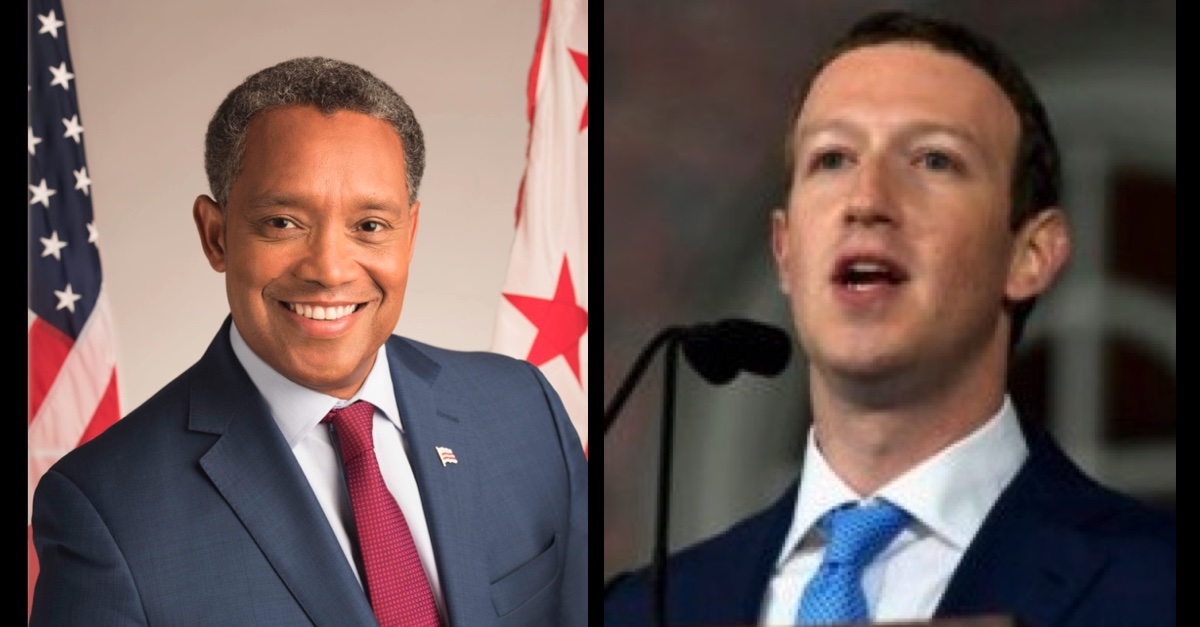
D.C. Attorney General Karl Racine (left) and Facebook CEO Mark Zuckerberg (right)
Listen to the full episode on Apple, Spotify or wherever else you get your podcasts, and subscribe!
When the Cambridge Analytica scandal broke in 2018, the now-former director of the Federal Trade Commission bureau that put Facebook under a consent decree about a decade ago recalled feeling “pissed.”
Now a professor at Georgetown Law, David Vladeck led the FTC’s Bureau of Consumer Protection when it put Facebook under a consent decree specifically aimed at curbing its privacy violations. Facebook’s violation of that order during the Cambridge Analytica scandal resulted in a record-breaking $5 billion civil penalty against the social media giant some six years later.
After the federal government dropped the hammer, the fallout continued on the local level in a recently filed lawsuit by D.C. Attorney General Karl Racine (D), who accused Zuckerberg of being “personally involved” in the decisions that led to 2016 election manipulation. Racine described his litigation as a “David v. Goliath” battle in a recent interview with CNBC.
On the latest episode of Law&Crime’s podcast “Objections: with Adam Klasfeld,” Vladeck agrees with that analogy and says that accountability for Facebook will only come when Zuckerberg feels pain from regulators.
“The real question is, when you’re trying to hold an entity like Facebook responsible, ‘Who ultimately is the final decision maker?’” Vladeck noted. “And Facebook is an odd organization because Zuckerberg owns virtually all of the stock that allows him to, you know, basically to do whatever he wants with Facebook.”
“Unless Zuckerberg is responsible for compliance, there really is no other way to threaten Facebook,” Vladeck declared.
Racine signaled his plans to sue Zuckerberg late last year, when he tried unsuccessfully to add the CEO to the lawsuit against Facebook. A judge rejected the move, finding that the attorney general waited too long to add him to the complaint.
The D.C. attorney general justified the delay on the fact that they learned new information over the course of discovery.
For Vladeck, a striking fact that Racine gleaned came in the form of an email that Zuckerberg sent on Oct. 27, 2012, a little more than two months after Facebook’s first FTC consent decree.
“I’m getting more on board with locking down some parts of platform, including friends’ data and potentially email addresses for mobile apps,” Zuckerberg wrote in the email, according to the complaint. “I’m generally skeptical that there is as much data leak strategic risk as you think. I agree there is clear risk on the advertiser side, but I haven’t figured out how that connects to the rest of the platform. I think we leak info to developers, but I just can’t think of any instances where that data has leaked from developer to developer and caused a real issue for us.”
Quoting from the email, Vladeck said that that such admissions were the same kind that inspired the second consent order, which put Zuckerberg “on the hook” for its dictates.
Vladeck, who also went after Google, noted that Big Tech companies have armies of lawyers dwarfing what federal regulators can marshal, let alone what local AGs can scrap together.
“So the question is, how much can a regulator devote to dealing with these platforms?” Vladeck asked.
Adding what he described as a “serious resource imbalance,” the professor added: “You can’t count the number of law firms that are on some of these cases, and they have an unlimited budget. And they have unlimited manpower that is very different than the D.C. AG’s office.”
Praising that attorney general, Vladeck said: “Karl’s a great lawyer. He has great lawyers working on these issues, but in terms of resources, the imbalances just stark.”
Listen to the podcast, below:
(Courtesy Karl Racine/Paul Marotta and Getty Images)